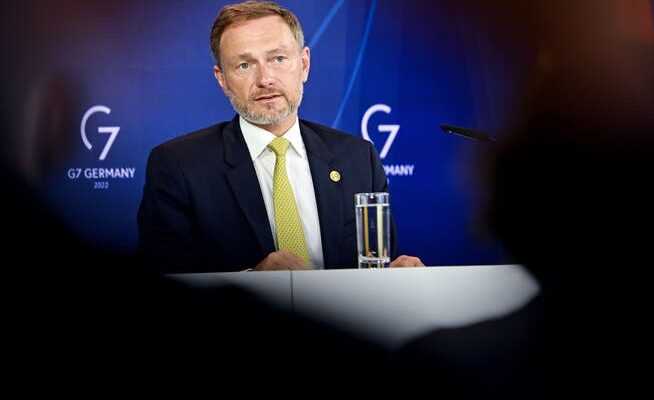Ukraine was also at the center of talks at the meeting of finance ministers and central bank governors on Friday. The country receives new aid money. Those responsible are also worried about high inflation and declining growth. The ECB should act soon.
Christian Lindner at the media conference on the Petersberg: The Minister of Finance currently sees inflation as a major threat.
«The financial situation of Ukraine must not have any impact on the successful defense capability of Ukraine», said German Finance Minister Christian Lindner (FDP) on Friday at the final press conference of the finance ministers and central bank governors of the G-7 countries on the Petersberg near Bonn. The participants of the meeting agreed on this. The group of seven economically strong democracies (G-7) consists of the USA, Canada, Germany, Great Britain, France, Italy and Japan. As clear as the solidarity for the country attacked by Russia was, the extent of the financial aid was at times unclear.
Gifts instead of loans
Ukraine had announced in advance that it would need 15 billion euros in financial aid over the next three months in order to be able to pay its civil servants and employees as well as pensioners and to keep the administration running despite the Russian invasion. The United States had announced early on that they would provide around half of the required amount, at $7.5 billion. The remaining amount, so it was said in the run-up to the meeting in the Siebengebirge from circles of the Federal Ministry of Finance, should be organized on the Petersberg.
Ultimately, however, the targeted sum of 15 billion euros was clearly missed. Overall, the G-7 spoke an additional $9.5 billion. In addition to the funds from the USA, 1 billion euros will come from Germany, as Lindner (FDP) announced on Thursday. The German gift – the money flows as a grant, not as a loan – should also be a signal to the other participants to provide large amounts.
However, only about another billion euros were collected, which according to Lindner all participating countries would contribute to varying degrees. On Wednesday, however, the EU Commission had already proposed to support Ukraine with a further 9 billion euros in “macro financial aid”.
taxes and government debt
The finance minister, however, told journalists that the funding goal had been exceeded because financial aid of over $19.8 billion had already been mobilized for Ukraine since the beginning of the year, including through international financial organizations such as the International Monetary Fund and the European Investment Bank. From 2014 to the beginning of this year, Ukraine received a good 60 billion dollars in aid, with Germany being the second largest donor after the USA.
In the run-up to the meeting, it was also said that if the targeted 15 billion euros were not reached, Chancellor Olaf Scholz (SPD) could try to close the existing gap at the G-7 summit of heads of state and government at the end of June in Elmau, Bavaria . Lindner didn’t want to know anything about that on Friday.
In addition to the all-dominant topic of the Ukraine war, discussions on other important economic areas were also on the Petersberg agenda, such as macroeconomic development and high inflation, progress in global minimum taxation, the solidity of public finances, and efforts to finance the energy transition and the status of the pandemic.
Several quick rate moves
“The G-7 is aware that inflation is currently one of the greatest economic risks,” said Lindner. The participants of the meeting are determined to stop inflation and stimulate growth. He recalled that the central banks were “very, very independent” in the direction of monetary policy, but also had a “very, very big responsibility”. Bundesbank President Joachim Nagel explained at the media conference that the European Central Bank (ECB) could stop purchasing securities in July and make the first rate hike in the same month.
Further rate hikes could soon follow. Other representatives of the Governing Council of the ECB had recently made similar statements. In view of an inflation rate of 7.4 percent in the euro area, there is already speculation on the financial markets as to whether the first interest rate hike might even amount to 50 instead of just 25 basis points.
Before and on the fringes of the G-7 meeting in Bonn, there were also discussions about the implementation of the planned oil embargo on Russia. US Treasury Secretary Janet Yellen had raised the possibility of imposing tariffs on Russian oil rather than a hard embargo. In this way, the USA wants to prevent violent price fluctuations and the resulting further increase in inflation. In the EU, however, one seems to continue to rely on an embargo as quickly as possible.
You can contact business editor Michael Rasch Twitter, linkedin and Xing and NZZ Frankfurt Facebook follow.
